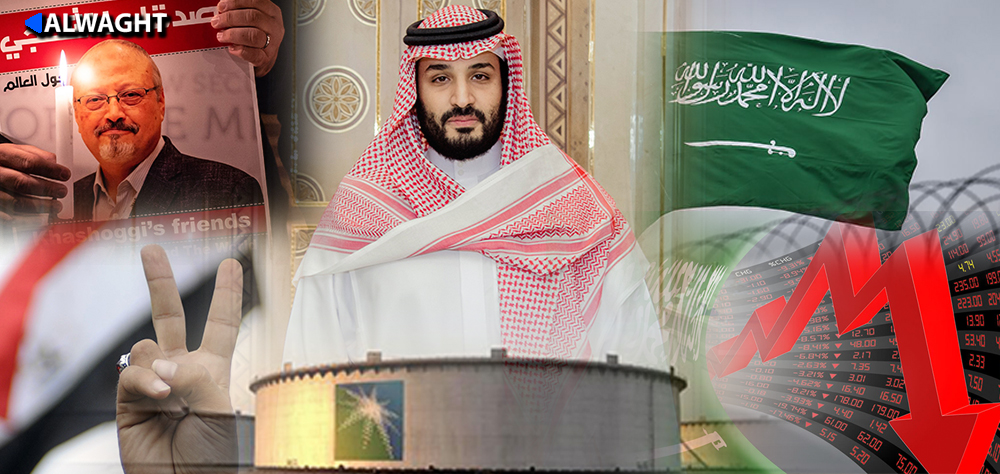Alwaght- Supporters of crown prince Mohammad bin Salman (MBS) label him the great reformer of the contemporary history of Saudi Arabia and his opponents paint him as an unpredictable power-hungry man who is ready to sacrifice anybody standing on his way to ascend to the throne of the Arab kingdom.
Since 2015 when Salman bin Abdulaziz ascended to throne, his son became the de facto ruler of the kingdom.
Although embracing social and cultural reforms won him popularity among the younger Saudi generations in the early stages of taking the crown prince position, his crisis-generating and costly foreign policy decisions, along with the crackdown on the civil and political activists, gradually cut the number of his supporters and increased his detractors.
Bin Salman, an unknown and inexperienced figure among other Saudi princes to lead Saudi Arabia in the generation after Abdul Aziz's sons, has always felt threatened since the bloodless coup against his cousin Crown Prince Muhammad bin Nayef in 2017. This fear has led to his paranoid view of military and political officials.
Since he replaced bin Nayef, at least five large-scale purge campaigns have been launched. Sacking of the commander of the war in Yemen Fahd bin Turki and his son for "corruption" in September 2020 is the last in a line of purges led by Prince Mohammed for a fear of actions against him by home opponents. It is said that bin Turki was at great odds with the prince over Yemen war and specifically the occupation of the strategic Yemeni island of Socotra and fall of Aden to militias loyal to the UAE, Saudi Arabia's war partner.
His other actions include the imprisonment of more than 300 wealthy Saudi businessmen and princes at the Carlton Hotel in Riyadh, the arrest of prominent members of the Allegiance Council and 300 government employees, the arrest of bin Nayef and Ahmad bin Abdul Aziz, King Salman's nephew and brother respectively, the arrest of Mutaib bin Abdullah, the arrest of Muslim scholars such as Salman al-Ouda, the leader of the Sahwa (awakening) Movement, clampdown against the women and rights activists, and also imprisonment of sons of the previous King Abdullah bin Abdulaziz.
Enemy at home
During his tenure, bin Salman never felt threatened as serious as today for assumption of the throne in the oil-wealthy kingdom. He has made so many wrong decision that today Saudi Arabia is weaker militarily and economically than at any other time in its modern history, and its regional and international prestige has never been this low.
Five years after bin Salman's massive military aggression on Yemen that came under the excuse of seeking to reinstall to power of the ousted Yemeni President Abdrabbuh Mansour Hadi, bin Salman’s coalition is fallen apart and the Saudi army aground in Yemen, Hadi's government in Aden exists only on paper, southern Yemen is controlled by forces loyal to Abu Dhabi and opposed to Saudi Arabia, and Ansarullah, the leading Yemeni revolutionary power player, still holds Sana’a and is still capable of firing missiles that can reach Riyadh, Jeddah and vast parts of Saudi Arabia,including the strategic Aramco oil giant, the war costs $1 billion a month, and international pressure to end devastating campaign has increased.
In these dire straits, bin Salman's suspicions about White House plans after Trump left the White House and the Democratic administration came up with harsh slogans against the prince's repressive and crisis-ridden actions, such as the assassination of Jamal Khashoggi, the crackdown on women activists and dissidents in the Saudi family, intensified his paranoid view of his relatives, especially inside his own family and his brothers. Al-Ahd Al-Jadeed news outlet has recently reported, citing informed sources, that the crown prince imposed a travel ban on his brother Sultan bin Salman.
Salman married six women during his lifetime. 12 sons and a daughter have been the result. 9 brothers of Mohammed, named Sultan, Abdulaziz, Faisal, Saud, Turki, Nayef, Khalid, Bandar, and Rakan are alive.
As bin Salman's feeling of fear and threat by the White House pressure on his father and also possible actions of the home opponents have already grown to the highest levels, his fear moves beyond his cousins to reach his own brothers. Detaining and Cracking down on opponents, bin Salman is seeking to tell his adversaries he is powerful and in control, but the messages the purges and pressures send out deliver the reverse, telling of volatility of the kingdom conditions under Prince Mohammed. This further validates the critics and dissenters' warnings about the risks of him taking the power.



























